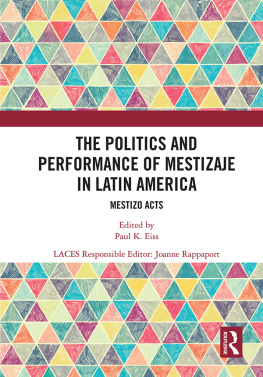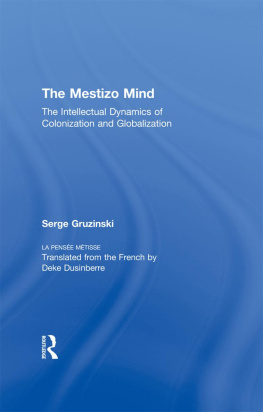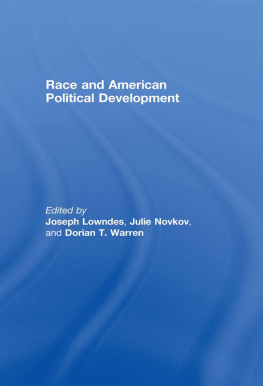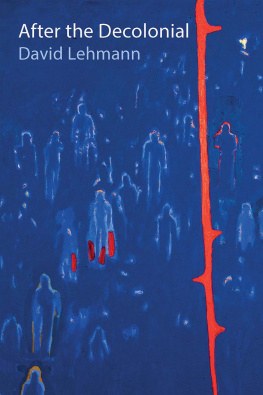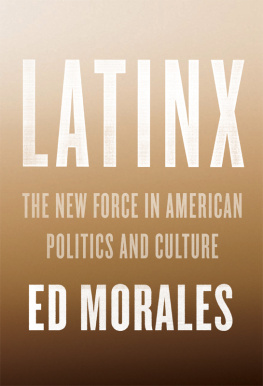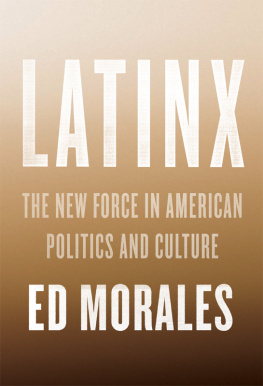The Politics and Performance of Mestizaje in Latin America
The term mestizaje is generally translated as race mixture, with races typically understood as groups differentiated by skin color or other physical characteristics. Yet such understandings seem contradicted by contemporary understandings of race as a cultural construct, or idea, rather than as a biological entity. How might one then approach mestizaje in a way that is not definitionally predicated on race, or at least on a modernist formulation of race as phenotypically expressed biological difference? The contributors to this book provide explorations of this question in varied Latin American contexts (Mexico, Guatemala, Bolivia, Colombia and Peru), from the sixteenth century to the present. They treat mestizo acts neither as expressions of preexisting social identities, nor as ideologies enforced from above, but as cultural performances enacted in the in-between spaces of social and political life. Moreover, they show how mestizo acts not only express or reinforce social hierarchies, but institute or change them seeking to prove or to dismantle genealogies of race, blood, sex and language in public and political ways.
The chapters in this book were originally published as a special issue of Latin American and Caribbean Ethnic Studies.
Paul K. Eiss is an Associate Professor of Anthropology and History at Carnegie Mellon, USA. In publications like In the Name of El Pueblo: Place, Community, and the Politics of History in Yucatn (2010), he explores labor, value, commodities, indigeneity, mestizaje, media, violence and the politics of historical memory.
Joanne Rappaport is Professor of Spanish and Portuguese at Georgetown University, USA. She is the author of The Disappearing Mestizo: Configuring Difference in the Colonial New Kingdom of Granada (2014) and Intercultural Utopias: Public Intellectuals, Cultural Experimentation, and Ethnic Dialogue in Colombia (2005) and coauthor (with Tom Cummins) of Beyond the Lettered City: Indigenous Literacies in the Andes (2011), Cumbe Reborn: An Andean Ethnography of History (1994) and The Politics of Memory: Native Historical Interpretation in the Northern Andes (1998).
The Politics and Performance of Mestizaje in Latin America
Mestizo Acts
Edited by
Paul K. Eiss
LACES Responsible Editor: Joanne Rappaport
First published 2018
by Routledge
2 Park Square, Milton Park, Abingdon, Oxon, OX14 4RN, UK
and by Routledge
711 Third Avenue, New York, NY 10017, USA
Routledge is an imprint of the Taylor & Francis Group, an informa business
2018 Taylor and Francis.
All rights reserved. No part of this book may be reprinted or reproduced or utilised in any form or by any electronic, mechanical, or other means, now known or hereafter invented, including photocopying and recording, or in any information storage or retrieval system, without permission in writing from the publishers.
Trademark notice: Product or corporate names may be trademarks or registered trademarks, and are used only for identification and explanation without intent to infringe.
British Library Cataloguing in Publication Data
A catalogue record for this book is available from the British Library
ISBN 13: 978-1-138-56433-6
Typeset in MyriadPro
by diacriTech, Chennai
Publishers Note
The publisher accepts responsibility for any inconsistencies that may have arisen during the conversion of this book from journal articles to book chapters, namely the possible inclusion of journal terminology.
Disclaimer
Every effort has been made to contact copyright holders for their permission to reprint material in this book. The publishers would be grateful to hear from any copyright holder who is not here acknowledged and will undertake to rectify any errors or omissions in future editions of this book.
Contents
Paul K. Eiss
Laura A. Lewis
Paul K. Eiss
Javier Sanjins C.
Deborah Poole
John M. Watanabe
Peter Wade
The chapters in this book were originally published in Latin American and Caribbean Ethnic Studies, volume 11, issue 3 (November 2016). When citing this material, please use the original page numbering for each article, as follows:
Paul K. Eiss
Latin American and Caribbean Ethnic Studies, volume 11, issue 3 (November 2016) pp. 213221
Laura A. Lewis
Latin American and Caribbean Ethnic Studies, volume 11, issue 3 (November 2016) pp. 222241
Paul K. Eiss
Latin American and Caribbean Ethnic Studies, volume 11, issue 3 (November 2016) pp. 242265
Javier Sanjins C.
Latin American and Caribbean Ethnic Studies, volume 11, issue 3 (November 2016) pp. 266286
Deborah Poole
Latin American and Caribbean Ethnic Studies, volume 11, issue 3 (November 2016) pp. 287304
John M. Watanabe
Latin American and Caribbean Ethnic Studies, volume 11, issue 3 (November 2016) pp. 305322
Peter Wade
Latin American and Caribbean Ethnic Studies, volume 11, issue 3 (November 2016) pp. 323343
For any permission-related enquiries please visit:
http://www.tandfonline.com/page/help/permissions
Paul K. Eiss is an Associate Professor of Anthropology and History at Carnegie Mellon University, USA. In publications like In the Name of El Pueblo: Place, Community, and the Politics of History in Yucatn (2010), he explores labor, value, commodities, indigeneity, mestizaje, media, violence and the politics of historical memory. Currently, he is at work on a study of practices and rhetoric of collective violence and collective self-defense in contemporary Mexico.
Laura A. Lewis is Professor of Anthropology at the University of Southampton, UK. In addition to numerous articles, she is the author of the books Chocolate and Corn Flour: History, Race and Place in the Making of Black Mexico (2012) and Hall of Mirrors: Power, Witchcraft, and Caste in Colonial Mexico (2003). She has received fellowships from the Guggenheim Foundation, the National Endowment for the Humanities and the Smithsonian Institution.
Deborah Poole is Professor of Anthropology at Johns Hopkins University, USA. Her most recent research examines cultural politics, expertise, decentralization and state form in Peru and Mexico.
Joanne Rappaport is Professor of Spanish and Portuguese at Georgetown University, USA. She is the author of The Disappearing Mestizo: Configuring Difference in the Colonial New Kingdom of Granada (2014) and Intercultural Utopias: Public Intellectuals, Cultural Experimentation, and Ethnic Dialogue in Colombia (2005) and coauthor (with Tom Cummins) of Beyond the Lettered City: Indigenous Literacies in the Andes (2011), Cumbe Reborn: An Andean Ethnography of History (1994) and The Politics of Memory: Native Historical Interpretation in the Northern Andes (1998).
Javier Sanjins C. is Professor of Latin American Literature and Cultural Studies at the University of Michigan-Ann Arbor, USA. He obtained his PhD in Luso-Brazilian and Hispanic-American Literatures at the University of Minnesota (1988), and a postdoctoral Rockefeller Foundation Fellowship at the University of Chicago (1995), USA. He has published extensively on Bolivian Literature and Cultural Studies. He was a founding member of the Latin American Subaltern Studies Group.

